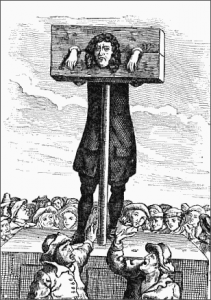One of the great myths, if not the greatest myth, propagated by publishers in the United States is the quote, “The people have a right to know.” No where in our United States Constitution is there a written right to know on behalf of the public.
It is my firm belief that, where enthusiasm protecting a free press in the United States has gone astray, we should concentrate on the public’s need to know, not necessarily a right to know. Clearly, the public needs to know everything about a potential officeholder which affects his judgment, honesty, dedication to public safety or any attribute bearing on his ability to fairly represent the public or perform ably in his or her duty. The public does not necessarily have a right to know whether a gentleman in public office wears briefs or boxers.
It wasn’t until the late 1700's in the United States that truth was a complete defense to libel and slander. The Zanger trial created the defense of truth. Unfortunately, in my opinion, courts have gone too far the other way in the protection of an uninhibited free press. It has always been my position that if the public has a right to know, the public has a right to know the truth. It appears to me it does little to preserve a free, American democracy, if we protect a lie.
The press’s theory is that it cannot be looking over its shoulder and should be able to be uninhibited in reporting--particularly on public figures who choose to thrust themselves into the limelight. With the case of New York Times v. Sullivan, the courts probably went a step too far. In order to hold the publisher of an out-and-out lie responsible for slander, it is necessary for a public figure to not only show that a lie was published, but that the lie was done maliciously with an intent to injure the person about whom the lie was published.
 As the printed press was a giant leap forward in transmission of information and knowledge to a broader spectrum of readers, recent electronic gadgets and ways to share information have made an equal leap forward in the ability to communicate. We now have radio and television; but even probably more important, we have the internet, blogs, face books, text messages, and God knows what else. Not only is it easier to publish information, it is also easier to verify or check the facts of information published.
As the printed press was a giant leap forward in transmission of information and knowledge to a broader spectrum of readers, recent electronic gadgets and ways to share information have made an equal leap forward in the ability to communicate. We now have radio and television; but even probably more important, we have the internet, blogs, face books, text messages, and God knows what else. Not only is it easier to publish information, it is also easier to verify or check the facts of information published.A frequently published blog in Jefferson County recently outlined in great detail a story claiming a state senator had arrived at a motorcycle rally at the bridge to Pleasure Island in Port Arthur. The blog went on to claim the state senator was confronted by a policeman demanding to know whether or not the senator had a gun. According to the story published in this blog, when the senator protested about being asked such a question, the policeman in charge simply told him he could hit the road because Port Arthur did not particularly like people of his kind coming to Port Arthur.
In view of the fact it seemed to be a black mark against Port Arthur and its finest law enforcement officers, and since I knew the senator personally, I took the time to pick up the phone and call the senator. It turns out the blog was a complete fabrication; not containing a grain of truth. A rhetorical question occurred to me: why should such misinformation have the same protection as a legitimate news source?
 I have recently published an opinion piece on why I think our legal system can enforce personal responsibility of peoples’ conduct. If you run over someone, you attack someone or you spill millions of gallons of crude oil into the Gulf of Mexico destroying peoples’ livelihood, why shouldn’t you be held to account for such bad conduct? The same would be true with regard to slander of an individual, whether a private citizen or a public figure. Why should publishers have protection from the consequence of shoddy or untruthful reporting?
I have recently published an opinion piece on why I think our legal system can enforce personal responsibility of peoples’ conduct. If you run over someone, you attack someone or you spill millions of gallons of crude oil into the Gulf of Mexico destroying peoples’ livelihood, why shouldn’t you be held to account for such bad conduct? The same would be true with regard to slander of an individual, whether a private citizen or a public figure. Why should publishers have protection from the consequence of shoddy or untruthful reporting?I submit freedom would be better protected if those publishing alleged facts were held to account as Thomas Jefferson suggessted for publishing untruths. The best way to hold them accountable is to make them liable for not checking the facts, willfully publishing false facts, or setting out maliciously to hurt someone. I submit democracy and a believable press would be better served by making those who publish accountable for publishing the truth.

No comments:
Post a Comment
All comments are reviewed and it may take a little bit before your comment is published. Anonymous contributions take a lot longer and may perish for lack of attention.